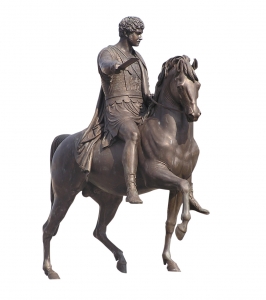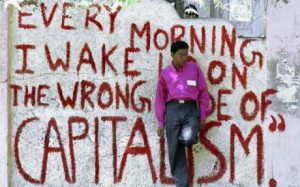Machiavelli’s “The Prince” is an intriguing text. Both historically and politically, it represents a fascinating study into the mindset of early 16th-century Florentine politics. But Machiavelli’s message has often times been misinterpreted. Either out of bad translations or the author’s sarcasm being distilled from generation to generation, somehow Machiavelli has become synonymous with everything bad within our political system. He’s become this figurehead for the aphorism, ‘the ends justify the means’, despite the fact that he never said that, or wrote anything to indicate that he thought it was true.
Machiavelli is perhaps one of the most tragic figures within history, though. After years of dedicated service to the Republic of Florence as the Head of the Second Chancery, he was imprisoned, tortured, and then exiled when the Medici family took over. During his years in exile, he spent all of his time writing some of the most famous and well-known (as well as well-studied) political texts that would further the science of Western politics. Besides “The Prince”, Machiavelli also wrote “Discourses on Livy”, “Florentine Histories”, “The Mandrake”, “Discourse on Reforming the Government of Florence”, along with countless other plays, pamphlets, and fictional works. But he is primarily known for “The Prince”. And despite all of his texts not only suggesting but proving his overwhelming republican political outlook, he is often related as a symbol for monarchy, autocracy, and tyranny. At one point in Renaissance history, his name was directly synonymous with the devil, and in Elizabethan theater he is a stock character for the ruthless-leader character/bad guy. When the Medici’s were invariably driven out of Florence, Machiavelli reapplied to his old republican position, but was denied because of “The Prince”—he died that same year.
As Machiavelli scholar, Garret Mattingly pointed out:
“I suppose it is possible to imagine that a man who has seen his country enslaved, his life’s work wrecked and his own career with it, and has, for good measure, been tortured within an inch of his life should thereupon go home and write a book intended to teach his enemies the proper way to maintain themselves, writing all the time, remember, with passionless objectivity of a scientist in a laboratory. It must be possible to imagine such behavior, because Machiavelli scholars do imagine it and accept it without a visible tremor. But it is a little difficult for the ordinary mind to compass.”
Mattingly, along with quite a few other Machiavelli and political scholars, have a hard time swallowing the idea that Machiavelli ever intended “The Prince” to be taken seriously, either then or now. Yet still, the common perception is that Machiavelli was the prototype for the “ends justify the means” corporate hero we’ve fabricated into our culture. For one, Machiavelli never said the “ends justify the means.” Rather, in chapter 18 of “The Prince” he said something to the effect that the ends should be looked at in conjunction with the means, but never in a degree to justify the former by the latter—mostly because, as an astute political strategist, Machiavelli knew that if the ends were to justify the means, then those ends would invariably be subverted.
 My question, though, is why Machiavelli is associated with non-republican government allegiances that are typically tyrannical? Despite countless evidence to suggest otherwise, why has Machiavelli become a figurehead for some of the most hated political leaders of the past 500 years? It’s already been proven countless times by scholars that Machiavelli was in fact being sarcastic in “The Prince” and that it’s best read as a political satire, but still the perception persists.
My question, though, is why Machiavelli is associated with non-republican government allegiances that are typically tyrannical? Despite countless evidence to suggest otherwise, why has Machiavelli become a figurehead for some of the most hated political leaders of the past 500 years? It’s already been proven countless times by scholars that Machiavelli was in fact being sarcastic in “The Prince” and that it’s best read as a political satire, but still the perception persists.
Do we live in such a patriarchal state that we’re willing to accept Machiavelli’s bitter sarcasm as factual political truth? Or is it that we’re a culture that can only recognize satire when it’s rubbed really hard in our face and is almost too blatant? The former would mean we’re content to live in a society where hierarchal patriarchy ruled policy; and then the latter would suggest that we’re stupid and vain.
While simply recognizing Machiavelli’s satire in “The Prince” wouldn’t necessarily change anything, it could expound upon a larger issue at work—one that surpasses a general lack of literary criticism. We’re a culture that needs a Machiavel, that character that comes in and displays a foolhardy egoism that constantly destroys and serves to oppose the “hero’s” action. It makes sense, at least dramatically. And so we impose this sense of rationality onto the real world, create Machiavels in which to blame the system. While there is a concentrated few that are primarily to blame for the condition of humanity in this modern age, the ultimate culprit for some of the core cultural disparities is caused by a lack of understanding.
With education, a sense of humor, and a realization that not all Machiavels are pitted against us, then maybe the world will see reason rather than rationality. And then perhaps we’ll recognize when a Machiavel is real, and when we’re fabricating them.
The Prince: Perceptual Misguidance,





Mary
23 Feb 2012Look what people done with the Bible or Koran.
Fer
23 Feb 2012That’s because sense of humor is something that politicians just don’t have. I remember reading an annotated version of the book, with the comment of several different actual princes and they all felt the need to make clear that they were following this book as a manual and beyond… Scary indeed.